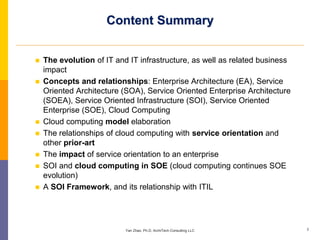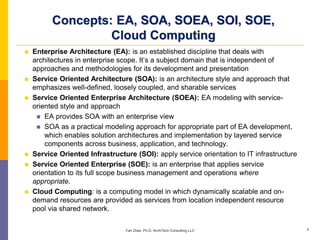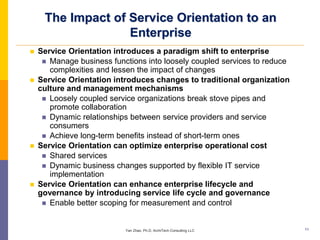Cloud Computing and SOA from Enterprise Perspective
- 1. Cloud Computing and SOA from Enterprise Perspective Yan Zhao, PhD ArchiTech Consulting LLC yan.zhao@architechllc.com www.architechllc.com Oct., 2009
- 2. Content Summary The evolution of IT and IT infrastructure, as well as related business impact Concepts and relationships: Enterprise Architecture (EA), Service Oriented Architecture (SOA), Service Oriented Enterprise Architecture (SOEA), Service Oriented Infrastructure (SOI), Service Oriented Enterprise (SOE), Cloud Computing Cloud computing model elaboration The relationships of cloud computing with service orientation and other prior-art The impact of service orientation to an enterprise SOI and cloud computing in SOE (cloud computing continues SOE evolution) A SOI Framework, and its relationship with ITIL Yan Zhao, Ph.D, ArchiTech Consulting LLC 2
- 3. The Evolution of IT and IT Infrastructure IT in Business Past Operation support Individual project based decision Ad hoc and technology driven implementation Current Trend Involved into business strategies and decisions (the agility of business depends heavily on the flexibility of IT for automation) Have long-term blueprint and big pictures as guidance (strategic plan and EA) IT Infrastructure Past Hardware, software, network components Infrastructure silos Current Trend IT infrastructure is a line of business; is a segment in Enterprise Architecture Service Oriented Infrastructure (infrastructure as a commodity service) Cloud Computing (promoted by Federal CIO, facilitated by industries) Yan Zhao, Ph.D, ArchiTech Consulting LLC 3
- 4. Business Evolution Associated with IT 1 2 3 Business Online Integrated Business Business On Demand Backend IT system Flexible IT infrastructure Web access via integration (SOI, IPv6, mobility, static web pages (interoperation across virtualization, cloud Systems, e.g. EAI) computing) Web access with Dynamic and adaptive Business integration web applications business processes (EA efforts across Online transactions organizational (EDA, service on with connections to stove pipes, SOA) demand) backend applications Integration of both Collaborative and Online presentation business and IT dynamic business The Evolution Path Enhanced IT Role in Business Yan Zhao, Ph.D, ArchiTech Consulting LLC 4
- 5. Concepts: EA, SOA, SOEA, SOI, SOE, Cloud Computing Enterprise Architecture (EA): is an established discipline that deals with architectures in enterprise scope. It’s a subject domain that is independent of approaches and methodologies for its development and presentation Service Oriented Architecture (SOA): is an architecture style and approach that emphasizes well-defined, loosely coupled, and sharable services Service Oriented Enterprise Architecture (SOEA): EA modeling with service- oriented style and approach EA provides SOA with an enterprise view SOA as a practical modeling approach for appropriate part of EA development, which enables solution architectures and implementation by layered service components across business, application, and technology. Service Oriented Infrastructure (SOI): apply service orientation to IT infrastructure Service Oriented Enterprise (SOE): is an enterprise that applies service orientation to its full scope business management and operations where appropriate. Cloud Computing: is a computing model in which dynamically scalable and on- demand resources are provided as services from location independent resource pool via shared network. Yan Zhao, Ph.D, ArchiTech Consulting LLC 5
- 6. Relationships: EA, SOA, SOEA, SOE, SOI, Cloud Computing ■ SOA needs to be enabled by Service Oriented Enterprise (SOE), where Service Oriented Enterprise Architecture (SOEA) helps. Cloud Computing is a SOA implementation in IT infrastructure (part of SOI) where to provide commodity services ■ SOEA is one way to develop EA, but not the only way, not cover the entire scope of EA either. ■ One major characteristic of SOA is loosely coupling. EA provides guidance, but shouldn’t restrict in component flexibility. Yan Zhao, Ph.D, ArchiTech Consulting LLC 6
- 7. The Progress in Federal Enterprise Architecture Federation The federation model fits federal government organization structure It provides horizontal partition to the complete EA domain Segmentation Segments are defined based on the lines of business (LoB) It provides vertical partition to the complete EA domain Service Orientation As an architectural style and approach, is well adopted in architectural practice. A practical approach for architecture development and implementation Cloud Computing It fits the paradigm of service orientation with loosely coupled and sharable resources It further enhances segmentation and federation implementation by enabling shared services and resources across organizations and segments Yan Zhao, Ph.D, ArchiTech Consulting LLC 7
- 8. Cloud Computing It is an evolution and re-packaging from what we have experienced already, is not a new technology, but is a new practice mechanism Prior-Art: Grid computing, utility computing, virtualization, SOA, SOI, Web Service, Application Service Provider (ASP), etc. Composition (extended from NIST draft): Characteristics: on-demand service, ubiquitous network access, location independent resource pooling, rapid elasticity, measured service Optional characteristics: multi-tenant enabled, resource virtualization, etc. Delivery Models: software as a service, platform as a service, infrastructure as a service Additional delivery models: business process as a service, data as a service, human service behind cloud Deployment Models: private cloud, community cloud, public cloud, hybrid cloud Additional deployment model: Peer-to-peer cloud (more suitable for IPv6) It enhances Service Oriented Infrastructure, and is a continuous evolution towards Service Oriented Architecture New innovations can be expected towards this new paradigm Yan Zhao, Ph.D, ArchiTech Consulting LLC 8
- 9. Service Oriented EA in EA Domain Application / System Business Architecture Architecture Service Oriented Enterprise Architecture Business Service Service Component Architecture Architecture Info/Data Technical Service Service Architecture Architecture Info/Data Architecture Technical Architecture * This is applicable to each EA segment, as well as to the complete EA scope Yan Zhao, Ph.D, ArchiTech Consulting LLC 9
- 10. Service Oriented Domain in Service Oriented Enterprise SOE Domain Enterprise Service Enterprise Service Planning Portfolio & Architectures Management Enterprise Service Enterprise Service Lifecycle Programs & Governance & Projects Service Oriented Domain Yan Zhao, Ph.D, ArchiTech Consulting LLC 10
- 11. The Impact of Service Orientation to an Enterprise Service Orientation introduces a paradigm shift to enterprise Manage business functions into loosely coupled services to reduce complexities and lessen the impact of changes Service Orientation introduces changes to traditional organization culture and management mechanisms Loosely coupled service organizations break stove pipes and promote collaboration Dynamic relationships between service providers and service consumers Achieve long-term benefits instead of short-term ones Service Orientation can optimize enterprise operational cost Shared services Dynamic business changes supported by flexible IT service implementation Service Orientation can enhance enterprise lifecycle and governance by introducing service life cycle and governance Enable better scoping for measurement and control Yan Zhao, Ph.D, ArchiTech Consulting LLC 11
- 12. Service Oriented IT Infrastructure for SOE Evolution of IT Infrastructure IT infrastructure as a commodity service IT infrastructure as a line of business IT infrastructure architecture as a segment architecture in EA Cloud Computing for Service Orientation It further implements service orientation for enterprise IT infrastructure services It shares the common nature, benefits, and impact in service orientation practice It is started as a technology solution, but the implication is far beyond technologies It needs enablement from SOE in order to identify and apply appropriate service model, funding model, cost model, and operation model across organization boundaries Yan Zhao, Ph.D, ArchiTech Consulting LLC 12
- 13. Service Oriented Infrastructure Framework Service Oriented Infrastructure Service Service Service Service Planning Systems Management Stakeholders • External and Internal • System operation • Business processes • Business decision drivers management and services makers • Strategies and • IT service • Application services • Service providers objectives management (ITIL) • Data services • Service consumers • Economics and • Service Lifecycle • Infrastructure • Elected officials and business cases services • Business regulatory bodies • Business plan and transformation and • Servers, storages, • Industry associations models change networks and standards groups • Segment Enterprise management • Data center facilities Architectures • Contractual management • Performance measurement model Security Governance Yan Zhao, Ph.D, ArchiTech Consulting LLC 13
- 14. The Relationship between SOI Framework and ITIL Objectives SOI Framework: demonstrate structure, components and relationships ITIL: provide management and operational guidance and reference Components SOI Framework: focus on functional components ITIL: focus on operational components Structure SOI Framework: categorized and layered components ITIL: management and operational lifecycle, and best practice references Yan Zhao, Ph.D, ArchiTech Consulting LLC 14
- 15. SOI Life Cycle and Governance ITIL Lifecycle components Governance Domain Service Service SOI Framework Strategy Improvement components Service Planning Service Service Service Stakeholders Operation Design Service Service System Management Service Transition Yan Zhao, Ph.D, ArchiTech Consulting LLC 15
- 16. Conclusion This presentation discussed: The current trend of IT and IT infrastructure Cloud computing model elaboration The relationships of cloud computing with its prior-art, including service orientation There are natural dependencies in enterprise with respect to service sharing, which can not be solved by technologies The roles of SOI and cloud computing in a Service Oriented Enterprise (Cloud Computing is a continuation of service orientation efforts in enterprise) Introduction of a SOI Framework The relationship of the SOI Framework with ITIL Yan Zhao, Ph.D, ArchiTech Consulting LLC 16
















